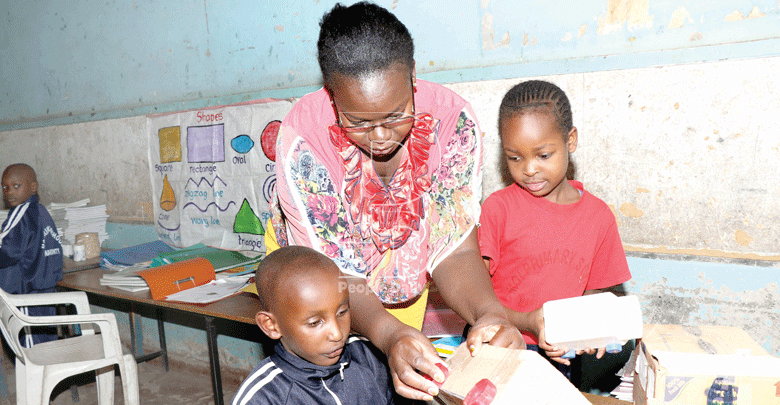The role of parents in their children’s learning process no longer starts and ends at paying school fees, thanks to the new Competency-Based Curriculum.
The new system has turned parents from mere spectators to active players in the learning process.
It is a whole new ball game for parents and guardians, especially working parents, who are supposed to help in their children’s homework every evening.
CBC has presented a new challenge, with most parents forced to adjust their schedules to get home in time for homework, which involves filling diaries, cutting out magazines, decorating portfolios, sewing, cooking and taking and printing photos.
For Margarita Achieng, a mother of two from Mukuru Kwa Reuben slum in Nairobi, it is no longer business as usual. She washes clothes for a living and is now forced to spare some money to buy materials needed for her children’s assignments.
At one time, the Grade Two pupil will be required to make a toy car using a box as part of homework, while another time he will be asked to make a bean bag.
“I wash clothes for people, and I barely survive on Sh200 a day, how am I supposed to purchase materials for making a toy car? I don’t even know what a bean bag is,” says the single mother, adding that she rarely has time to help in the homework.
Julius Kuria, whose son is also a Grade Two pupil at Lanet Primary School in Nakuru county, says he is yet to fully understand the “demanding” CBC curriculum. The new system has forced him to adjust his working hours to accommodate his son’s homework demands.


Although he supports CBC, he says it is costly on the parent’s part. He, for example, says his son is required to have things such as marker pens, manila papers and others items to do the assigned homework.
Unlike the 8-4-4 curriculum, which is being phased out, CBC has shifted focus from exams. It is more focused on gauging skills, competencies and abilities.
Parent availability
A typical Grade One homework exercise in CBC reads like; “Cut out 20 different foods you eat at home from magazines or print outs. Stick the pictures on an A4 white paper, circle all the foods that come from plants using a blue marker pen and circle all the foods that come from animals using a red marker pen.”
For Naomi Njeri, a mother of three who has to tackle such assignments everyday, the CBC system requires availability of at least one parent at any given time when their child is doing homework.
“Everything is so different now. They don’t even read the way we used to. I try to help out with homework, but sometimes it feels like I am the student. It seems like we are both in class and they are ‘unteaching’ me everything I thought I knew,” says Sophy Njoka, a parent of a Pre-Primary One (PP1) pupil at By Grace Nyali West Primary School.
Hilda Otieno, a parent of PP2 pupil at Precious Gift Academy in Nairobi’s Komarock says: “My biggest challenge is pronunciation of sounds.”
The challenge is even greater for parents who have never stepped in class and feel inadequate to help in the homework.
Wako Wario, a parent at a Moyale Someni Academy in Marsabit County regretted that the new curriculum does not consider the illiterate parents.
“I didn’t attend any formal school. Neither do I know how to write. How will I help my child who needs my help yet I don’t know how to read? I prefer the old curriculum. The new one is a headache to us,” says the 47-year-old.
Adult education
Wario urged the Education ministry to consider training illiterate parents on the new curriculum, adding that most are groping in the dark.
Most parents in the North Eastern region who spoke to People Daily said the new curriculum might force them to undergo adult education so that they can help their children.
“We are told we have to help our children do their homework yet we are illiterate. I might need to enrol into a Gumbaru school,” said Abdi Hussein, a parent.
Rukia Ahmed, a resident of Bulapesa area in Isiolo county, says she is yet to understand what is expected of by the new curriculum. Citing a case in which her son Shukri Wario, a Grade Two pupil, was given an assignment over the midterm break to make a shirt out of a sack, Ahmed says she was caught flatfooted.
“It was very involving and came at a cost since I had to source for the sack and thread from the market. I should admit though, that I enjoyed helping him stitch up the shirt because there was creativity involved,” says Rukia, pastoralist.
However, she says, there are mathematical activities that she can’t handle and has to seek the help of her neighbour.
Rukia also says the curriculum presents a challenge to parents from pastoralist communities. “We have decided that I should stay at home to help the children while my husband goes to look for pasture,” she says.
Few challenges
Titus Ngatia, a member of the National Steering Committee on Curriculum Reforms, said the decision to involve parents in the implementation of the programme was deliberate and was meant to ensure they are part of their children’s day-to-day learning.
“This system offers a more expanded involvement by parents, who must always work with the school to ensure children are learning,” he explains.
He acknowledges there are a few challenges experienced in some aspects of the system, such as extra costs involved as well as illiteracy of some parents. Ngatia assured that a robust parental empowerment and engagement programme is being formulated.










